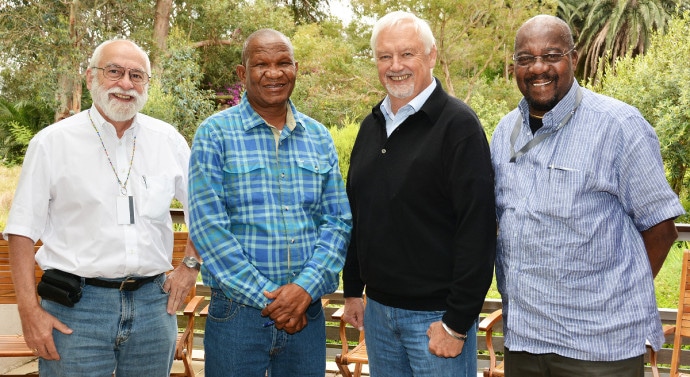“Agriculture in the southern Africa region is faced with major constraints affecting the region’s ability to provide sufficient and nutritious food to both urban and rural populations in the near future. Rapid urbanisation, population increases, soil degradation, limited access to improved (modern) and appropriate production technology, reduced water availability, pre- and post-harvest pest losses and market forces are weak links in the food chainthat impacts effective agricultural production,” says Richard Sikora. “Add to this the adverseeffects of climate change over the next 35 years on water availability in the region and we have a recipe for disaster unless concerted actions are taken. It’s estimated that by 2050 Africa will only produce 13% of its food needs unless agricultural production is significantly improved. That’s why there is an urgent need to intervene now and plan for a transition to improved agricultural systems management – a transition in the way agriculture is performed in southern Africa to insure there is sufficient and nutritious food in everyone’s food basket.”
Sikora is one of a team of five international agricultural specialists working at the Stellenbosch Institute for Advanced Study (STIAS) to conduct a five-year programme on Sustainable Food Production in southern Africa with a major emphasis on identifying options for agricultural transformation in the region. As Fellows of STIAS, the team will develop a framework and work programme entitled ‘Strategic Directions for Agricultural Transformation in southern Africa’. This is part of a STIAS research theme on Sustainable Agro-Ecosystems. The team, which has vast experience in Africa and internationally, has proposed the major goal to be determining the strategic directions for agricultural transformation in the region towards a 2050 horizon with an initial focus on sustainable agricultural intensification. They plan to evaluate the realities of agriculture in the region and the effects of intensification on food security.
Africa (often considered a future breadbasket of the world), is now strongly affected by food insecurity and malnutrition challenges which are set to worsen if leftunresolved. Accelerated urbanisation and population growth, coupled with ecosystem degradation, weak agricultural extension services and poor infrastructure negatively influence food production, storage and distribution in many countries.
“Our project’s time horizon is 2050. It is predicted that population growth inSub-Saharan Africa is set to explode from 1 billion today to between 3.5 billion and 5 billion in 2100,” says Eugene Terry. “This would trigger an exponential increase in the region’s food and nutrition insecurity.”
The initial phase of the programme has involved seminars and brainstorming sessions with experts from all over the world and the region. Topics addressed have included livestock, water resources, soil fertility and cropping systems, soil degradation, pre- and post-harvest losses to pests and diseases, climate impacts on agriculture, agricultural economics and plant biotechnology.
“Through these sessions an attempt has been made to focus on a wide range of biological, biophysical, policy and institutional factors that will impact on the types of agricultural intensification envisaged for the region and beyond,” says Terry.
This programme will focus on food production in core countries in southern Africa (South Africa, Namibia, Zimbabwe, Zambia, Botswana, Lesotho, Swaziland, Malawi and Mozambique). It is estimated that currently up to 70% of the region’s population is directly dependent on agriculture for employment and food. “Scenarios and options developed will be based on the needs of individual countries, but the region as a whole working together will not be overlooked,” says Sikora. “Although the focus is southern Africa, we believe the findings generated will be important in other parts of the world with similar climatic and cropping patterns.”
By combining traditional and modern technologies, the programme will attempt to formulate multi-disciplinary solutions.
“The idea is to look at what we need to do now to ensure that we can still feed people in the region by 2050 and beyond,” says Sikora.
Dialogue
The initial conceptualising phase will be followed by a high-level Roundtable Dialogue from 23 to 25 February 2015. This will be convened by STIAS, co-sponsored by the Marianne and Marcus Wallenberg Foundation and co-organised by Ms Maud Olofsson (Minister for Enterprise and Energy from 2006 to 2011 and Deputy Prime Minister of Sweden from 2006 to 2010).
“This is the third Roundtable we have hosted. Previous roundtables have addressed energy and mental health,” says Maud Olofsson. “The idea is to expose policy makers, the public and other stakeholders to issues at the cutting edge of science with the aim of positively influencing policy making into the future.”
The aim of the Roundtable is to elaborate the key sustainable interventions for agricultural transformation in the region. The Roundtable will be structured to provide the participants an opportunity to define and articulate:
- Their vision of agricultural transformation in the region, occurring simultaneously with major structural transformations in urban migration, shifts in economic growth patterns, and new opportunities for livelihood generation on and off-farm.
- The major reforms in policies, markets, science and technology applications, infrastructure, land-use patterns, production systems, intensification interventions, and the institutional arrangements and private sector participation, that will enable transformation.
- The resource-mobilisation pathways to be adopted to ensure the flow of resources for effective implementation of the envisaged transformation.
This will then be used to develop a roadmap of prioritised actions and milestones.

